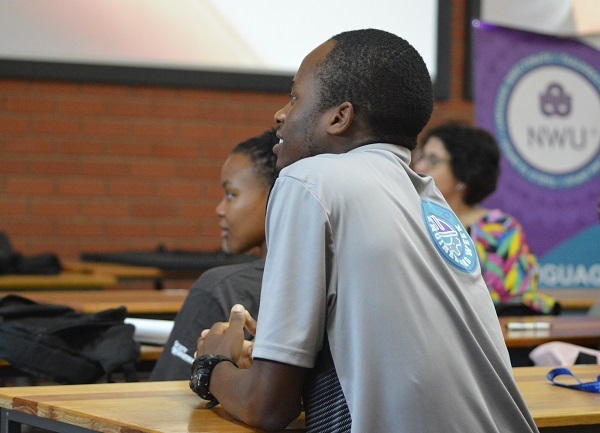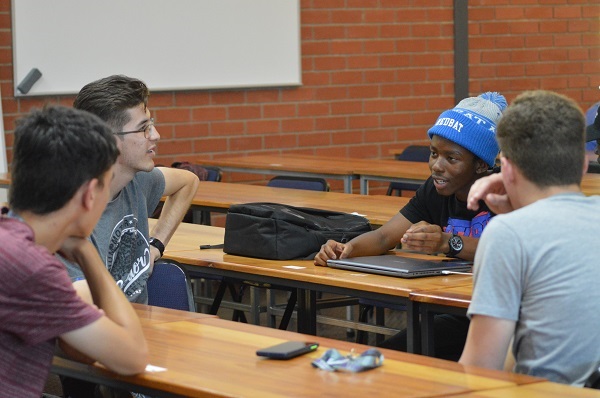It was a fun-filled, educational, and fascinating day for the first-year engineering students, with activities varying from learning a novel word in a different language to answering the question: “Why did you choose to study Engineering?” in their mother tongue. As these students come from multilingual societies that practise translanguaging, they could communicate relatively effortlessly with one another.
On Wednesday, 21 February 2024, the Faculty of Engineering celebrated International Mother Language Day by involving their first years in a mandatory interactive translanguaging programme that was split into two sessions to accommodate all the groups. The aim of the programme was not only to make the students aware of the linguistic diversity of our multilingual society at the NWU, but to guide them in using their mother languages for learning purposes in order to promote inclusivity in their study groups, leading to academic success.
Among the attendees were Prof Liezel van Dyk, the executive dean of the Faculty of Engineering (FENG), and Prof Rosemary Cromarty, who is a research coordinator for Language Planning, Monitoring and Evaluation at the NWU Language Directorate.
Translanguaging
According to Willem Botha, an interpreter at the NWU, translanguaging occurs when individuals use their full set of languages in a context-specific manner so that nobody feels excluded whenever they interact with one another. He went on to say that: “Translanguaging focuses on communicating effectively and allowing languages to complement (rather than compete with) each other."
Bearing out Willem’s words, the students participated in a series of group engagements in which they had to demonstrate how a group of students speaking diverse languages can share the same space, communicate, and convey meaning.
Ayanda Nzo, senior lecturer at the School of Mechanical Engineering, discussed the FENG Language Plan. He explained: “We hope the students recognise that our linguistic diversities should not be barriers to, but enablers of learning.”
The FENG Language Plan
The FENG Language Plan aims to facilitate the education of engineers who have to be fluent in English in their profession, taking cognisance of the fact that these students enter the education system from multilingual and multicultural backgrounds.
The plan uses innovative approaches to introduce existing and planned bi- and multilingual practices of the Faculty of Natural and Agricultural Sciences with respect to common modules from the various BEng curricula that are presented on the Potchefstroom Campus.
It operates under an 18-18-12 approach, with students being given the opportunity during the first 18 months to listen, read, speak and write all modules in the language in which they matriculated (either English or Afrikaans), except Academic Literacy (ALDE111), which must be taken in English by all Engineering first years. The faculty also tries to include Setswana glossaries for most first-year Engineering modules.
Two first-year Engineering modules (INGM111, INGM121) were identified as flagship modules in which multilingualism, translanguaging and terminology development were introduced. These modules are presented as service modules to 90% of all first-year Engineering students by the School of Mechanical Engineering. In 2023 EERI124, another first-year module, presented by the School of Electrical, Electronic and Computer Engineering, was added as flagship module too.
The second phase of 18 months sees a practical multilingual approach being followed to transition from the multilingual approaches of the first two years to a monolingual approach during the third academic year.
The Engineering Council of South Africa (ECSA) requires that during the final twelve months – the final year – the curriculum must be fully monolingual in all respects to prepare students to function fully as professional engineers through the medium of English. At the NWU, the Afrikaans, Setswana, and Sesotho translations of the title and abstract of each final-year Engineering project will be provided and displayed at the final-year project day and published on social media and the website, as appropriate.
To facilitate the academic journey of the current first-year engineering students, the language plan will ensure that during lectures interpretating to English, Afrikaans, Setswana and Sesotho will be made available.
In her closing remarks, Prof Liezel van Dyk thanked all the students for their cooperation during the successful celebration of International Mother Language Day.

Prof Liezl van Dyk, executive dean of the Faculty of Engineering, in attendance at the International Mother Language Day celebration of the Faculty of Engineering on the Potchefstroom Campus.

Teboho Mokejane, a first-year BEng student in Electrical and Electronic Engineering, participating in the question-and-answer session.

Students in Computer, Mechatronic and Electronic Engineering during their group engagement activity.
